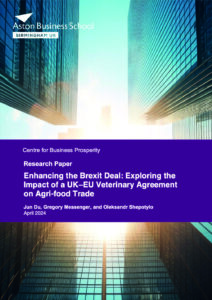Among its pledges to support farmers, Defra ministers have pledged to seek a new veterinary agreement with the EU to reduce the costs and bureaucracy now associated with trade in food products. ALISTAIR DRIVER looks at what it could mean for the pig sector
A central plank of the Labour government’s ‘new deal for farmers’ is a commitment to negotiate a new deal veterinary agreement with the EU to ‘cut red tape at our borders and get British food exports moving again’.
The meat and livestock sectors are generally in enthusiastic support of a new agreement that would reduce some of the crippling costs – estimated in the ‘hundreds of millions’, so far – and bureaucracy associated with our post-Brexit trading arrangements with the EU.
See also: Government to seek new veterinary agreement with the EU as part of new deal with farmers
There could be a positive impact on the trading rules around African swine fever (ASF) in the event of a UK outbreak.
There is, however, a determination to ensure that any moves to lift the current bureaucracy do not render the UK even more vulnerable to unchecked commercial meat imports and an ASF incursion.
Current situation
The UK’s formal departure from the EU in January 2021 immediately subjected UK food exports, as a third country trader, to a new set of rules and associated costs, inspections and bureaucracy.
This included a requirement for export health certificates (EHCs) for products of animal origin, which require a vet’s signature, taking up significant veterinary resources, and physical checks at border control posts (BCPs) to ensure compliance with EU standards.
Equivalent EHC requirements and border checks for medium- or high-risk imports have only just been, very gradually, introduced in the UK since April.

According to British Meat Processors Association (BMPA) chief executive Nick Allen, the export requirements have already cost the industry hundreds of millions of pounds, with the import costs now being felt, too.
“The basic upfront cost is about £1,500 per lorry, and that is before all the staff who prepare and check the paperwork,” he said.
Meanwhile, UK businesses are starting to be charged ‘up to £870 per truck’ in common user charges for importing meat and plant products through Dover, rather than the maximum of ‘£145 per truck’ claimed by former Conservative ministers’, Mr Allen said.
He pointed out that the charge is applying to all consignments through Dover, even though only 2% are
being checked.
Jason Aldiss, head of external affairs at the Association of Independent Meat Suppliers (AIMS), said EHC certifications were ‘time-consuming, costly, and contribute to inefficiencies’, particularly for smaller, independent meat suppliers who may not have the resources to manage these additional requirements effectively.
“In addition, the checks at BCPs are often carried out inefficiently, leading to delays that disrupt supply chains, adding unnecessary complexity to the process,” he said, adding that the disruption and costs for large and small businesses have affected overall industry efficiency and profitability.
NPA senior policy adviser Katie Jarvis pointed out that, in addition, the UK is still unable to export pigs for breeding to the EU because there are no EU BCPs available to inspect pigs.
A new deal?

It is still relatively early in the lifetime of this new government and, with the UK parliament just coming out of summer recess and the European parliament still taking shape after June elections, little tangible progress has been made so far.
However, according to Mr Allen, very provisional, unofficial talks between the UK and EU are understood to have taken place.
“The government has done what it said about starting negotiations on a new veterinary agreement and we understand that things are just starting to happen,” he said.
However, once official talks get formally under way, this will be a complex negotiation and there will not be a speedy resolution.
Defra confirmed, as part the government’s work to reset its relationship with the EU to tackle barriers to trade, it will seek to negotiate a veterinary agreement to prevent unnecessary border checks and help to tackle the cost of food.
However, acknowledging that delivering new agreements will take time, it is not putting a deadline on this work.

What could a new agreement look like?
The key outcome to any veterinary agreement will be the removal of EHCs and the extra inspections – in other words, a return to something like pre-Brexit arrangements.
But it will not be that simple, mainly because removing the barriers to trade could only happen if there is some sort of agreement to realign production standards.
“The whole cost of both of exporting and importing is just a nonsense, given that we are still virtually following the same regulations,” Mr Allen said.
“A new veterinary agreement would remove the need for EHCs both ways and all the cost and bureaucracy that goes with it, and also reduce the number of inspections.
“But it would depend on both sides doing more or less the same thing in terms of regulation. What has to be negotiated is whether the UK would want to retain its right to diverge, if it wants to.”
There is a precedent. Switzerland is not in the EU but has a veterinary agreement with it, setting out measures covering animal health, food safety, animal husbandry and trade in live animals and animal products.
It forms the basis for ensuring that EU and Swiss regulations on the prevention of epizootic diseases are ‘essentially consistent and lead to the same outcomes’, enabling equivalent trading conditions without veterinary border controls between the two.
Consignments from third countries are controlled on entry into the Switzerland-EU veterinary area and can then be freely traded.
To help manage the agreement and ensure common standards, representatives from Switzerland and the EU meet at least once a year in the Joint Committee on Agriculture.
Mr Allen noted: “With the Swiss arrangement, if they want to change a regulation, they discuss it with Europe first.”
Speaking at a discussion hosted by the UK Trade and Business Commission, Gail Soutar, NFU chief EU exit and international trade adviser, urged the government to continue to engage constructively with the EU on reducing trade frictions.
“I don’t necessarily want to get hung up on whether that’s a New Zealand-style veterinary agreement or a Swiss-style model – we are in a bespoke situation. We are the closest major market for the EU.
“It’s in both sides’ interests to try and get a very bespoke, robust agreement that seeks to minimise as much friction as possible,” she said.

Mr Aldiss said removing the need for all export and import certification under a full veterinary agreement would significantly reduce costs and minimise administrative burdens.
“If checks at BCPs must continue, they should be carried out consistently and efficiently,” he added.
“AIMS strongly supports the development of a comprehensive veterinary agreement that is necessary to support the competitiveness and sustainability of the UK meat industry.
“While the exact timelines for implementing a new veterinary agreement are uncertain, we emphasise the urgency of initiating these changes.”
AIMS is advocating for an immediate transition to a trusted trader risk-based approach, which would allow low-risk, trusted traders to move meat with minimal checks, expediting the process.
Over time, this system should evolve to completely remove veterinary checks at the borders for such trusted entities, Mr Aldiss added.
He said the transition process should begin immediately, with clear milestones and deadlines to ensure rapid progress.
From a veterinary perspective, a new deal would certainly relieve some of the additional workload they have been lumbered with in inspecting and signing off thousands of products of animal origin leaving GB ports.
British Veterinary Association president Anna Judson said: “Securing access to vet medicines in Northern Ireland beyond 2025 must be a priority for the new government and the proposed EU veterinary agreement could provide a much-needed solution to the issue.”
Potential trade benefits

Research by Jun Du, Gregory Messenger and Oleksandr Shepotylo at Aston Business School, in Birmingham, has concluded that a new veterinary agreement could deliver significant benefits for trade.
Their study analysed the potential impact of different types of trade agreement on UK-EU trade, focusing on commitments related to trade in agri-food, specifically sanitary and phytosanitary (SPS) measures aimed at protecting human, animal, plant life or health.
It examined data from 279 trade agreements and highlighted the effectiveness of comprehensive and legally enforceable agri-food related commitments in trade agreements.
It indicated that the conclusion of an EU-UK veterinary agreement could lead to a 22.5% increase in agri-food exports and a 5.6% increase in imports, while also adding 0.22% to the agricultural sector’s value added.
“This matters to the survival of many SMEs and the price of UK food,” the researchers said.
They said the common assumption that the agreement would require the UK to follow EU rules, along the lines of the Swiss model, was ‘not necessarily the case’.
The analysis shows the UK could agree to align with EU rules, but this is not the only available approach.
“For example, the UK and the EU could agree to recognise each other’s rules for specific products as equivalent, such as testing procedures to confirm lamb meat is free of certain diseases.
“Additional commitments would be necessary to ensure both sides are aware of any relevant regulatory changes. This approach, while challenging, is entirely feasible and offers a flexible pathway to improving trade relations.”
The research warns that the negotiations are ‘complex and fraught with political sensitivities’. For example, a Swiss-style approach may not be acceptable in the UK, while any perception of UK ‘cakeism’ is likely to be rejected by the EU.
ASF benefit?
A veterinary agreement could potentially benefit the UK pork sector in the event of an ASF outbreak.
EU veterinary regulations enable countries with ASF outbreaks, like Germany, Poland and Italy, to continue exporting pork products from non-controlled areas elsewhere in the EU.
Under current arrangements, these countries can continue exporting to the UK, but there are currently no reciprocal arrangements in place in the event of a UK outbreak.
According to industry analyst Mick Sloyan, as part of the UK contingency plan for animal disease, if we discovered ASF, Defra would withdraw EHCs until an agreement could be reached with importing countries.
“Defra has warned that this could take some time and could extend to when this country is declared free from the disease, which could be many years,” Mr Sloyan wrote in the Weekly Tribune.
“If the new government can negotiate a comprehensive veterinary agreement with the EU, this would presumably include animal disease arrangements, as well as removing the need for EHCs.”
But he said negotiations on mutual recognition of animal disease control procedures may be difficult. “The problem is that the UK has already conceded the point to the EU seemingly without a reciprocal arrangement in place,” he said.
The NPA’s Katie Jarvis added: “On regionalisation, the agreement could be a benefit as EU countries would consider our disease control measures to be equivalent to theirs.
“Currently, our measures are not quite aligned, which could prevent a regionalisation agreement should we end up with ASF or another notifiable disease.
“This is being addressed in the amendments to change to align our control measures with the EU’s, but this has been very delayed and we are still no closer to seeing them published.”
Import risk?
While the upsides to a veterinary agreement in terms of trade are obvious, one concern is that it would mean fewer checks on EU imports.
The context, of course, is that there have been very few checks, anyway, since January 2021 and, even as EHCs and inspection requirements have been introduced this year, they are currently being performed at such a low level as to be almost negligible.
Mr Allen said a veterinary agreement wouldn’t necessarily increase the risk of infected meat imports getting through.
“Currently, if pork reaches France from an infected part of Romania, it is not their responsibility if it gets to the UK, so, perhaps, they don’t take as much care. Under a veterinary agreement, that would change. Europe would have a responsibility to make sure all the proper checks are done and to make sure disease doesn’t move here,” he said.
Ms Jarvis said: “We wouldn’t have as many checks on imports or exports, which in theory would improve trade, which has fallen since Brexit and remove the additional costs to industry.
“But we continue to be very concerned about the risk of bringing ASF-infected meat in from Europe, so we would want any agreement to take into account the growing threat ASF poses and ensure sufficient checks are carried out.”
The BVA’s Dr Judson added: “It’s vital the government doesn’t lose sight of the importance of UK biosecurity and disease control, ensuring any risks are considered and mitigated. It’s therefore important that Defra works closely with the veterinary profession to get the details of the agreement right.”




